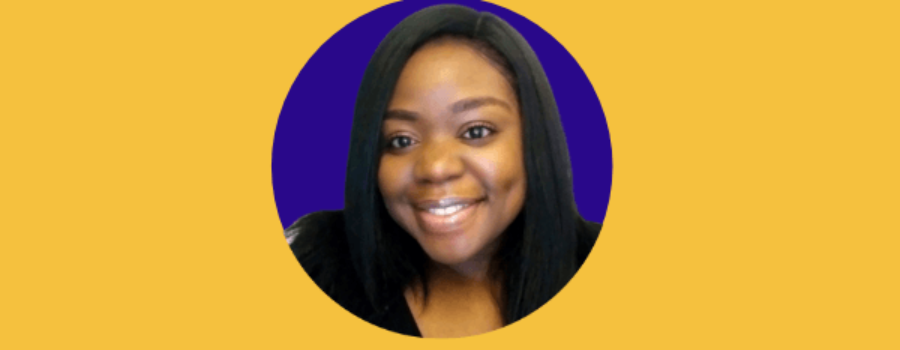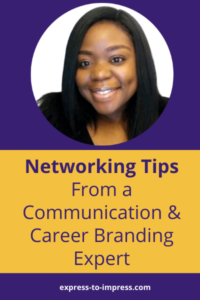Introduction to Networking Tips
Hello! It’s Kristine here with the Express to Impress podcast. This episode is part two of Will networking get me a job? Strategic Networking with Lucy Samuels. So, if you haven’t listened to the previous episode, I recommend you check it out before listening to this one with more networking tips.
As a reminder, Lucy Samuels is a language and communication coach with more than a decade of experience working with job seekers. One of her specialties is teaching people to network strategically, and you’ll learn many networking tips from her in this episode!
Can’t read it now? Pin it for later!
Before we listen to the rest of my conversation with Lucy, I want to share a quick reminder that you can subscribe to receive notifications whenever I release a new episode. You can subscribe on Apple Podcasts, Spotify, and all other major podcast directories. And if you have an interview coming up, I invite you to visit my website for my free five-step job interview preparation checklist. This checklist has already helped thousands of people worldwide get jobs they love. To sign up, visit my website at express-to-impress.com.
Alright, let’s jump back in, where you’ll be getting more networking tips from Lucy.
Networking Tips
Kristine
Do you have any other tips for networking successfully and effectively?
Lucy
I do. A lot of times, as I mentioned, people feel like it’s transactional. Well, if I reach out to this person, they’re going to know that I want something. And sometimes they do! That’s not always a bad thing! And I think that it’s often important for people to think about what they might have to offer. Maybe you know a lot of people. Maybe you’re looking to do freelance projects, but you’re also helping someone. Sometimes we forget that people hire because they have a need. So, think about it like that.
I’m not a recruiter, but I’ve been in a position where I had to interview candidates. I didn’t have time on top of my regular responsibilities to the read-through 200 resumes, so I would call someone and say, hey do you have any folks who would be great in this role? Let me tell you a little bit about it. And so now I’m looking at ten resumes instead of 200, and that means a lot to me. So think about what you might be able to offer. I was getting someone, a team member, and then I could go back to my regular job and stop this recruiting business. And the other person was getting a replacement for someone that would count towards her own work.
You might think of it as like I want something, but that person’s probably looking for something too. And that’s fine. And then sometimes there are people who really just want to help.
I work with college students, and a lot of them, when they’re done with the program that we do together, they will say, “I’m here to talk to other students…anybody who’s in the program, you can send them my way.” I’ve gotten that a lot. There are a lot of people who are genuinely interested in helping folks. Rather than assume the worst like “I’m using them.” or “They’re not going to want to talk to some rando on the internet.” I’ve gotten that also, and I’m like, you know there have been people who are randos until they’re not. And I say rando- and that’s not my own word, that’s a word I’ve heard people use. But some random person on the internet that you don’t know can often become a co-worker, a trusted colleague in the future, so just remember that too.
LinkedIn Networking Strategies
Kristine
Absolutely, and I’m curious, have you seen people have success in reaching out to alumni? Like fellow alumni? That’s been one area I’ve directed people to, and LinkedIn has a nice feature that allows you to find people in your same industry. Or you can even see what companies they work for, so it can help you find relevant alumni that you could reach out to.
Lucy
I have. I did so just today, actually. And we can’t really talk about networking nowadays without talking about LinkedIn. So, I should just also add I recommend having a profile that you don’t mind people looking at; not just a profile to say that you have one, but if someone at your dream job looks at your profile, are you going to be nervous because oh my goodness it looks terrible. Or are you going to say, wow, I can’t believe that the manager at this company that I want to work at has looked at my profile? That’s super exciting for me. So that’s one thing I should have added.
We can’t talk about these things without LinkedIn, but LinkedIn is a great resource tool. It’s great to find people, and so I do agree with you that, reaching out to alums, it’s another way of reaching out to people you kind of already know. So I can say:
I see that you went to Thomas Edison University. I went there too, and I had the same major. I’d love to connect with you.
It’s short, and it’s sweet. It’s not asking for anything if you’re worried about that. And you’re not just saying, “I saw your profile, and I’m just connecting with you for absolutely no reason.” You’re letting the person know what you thought was interesting.
Oh, I have the same major. I’d love to see what you’re doing with it.
And that could also be the foundation for the informational interview.
It all starts with that first short, sweet message. I think LinkedIn only gives you 300 characters if you don’t have a premium subscription to reach out to that person and attach a note to your invitation to connect.
Kristine
Nice. I love that introduction. It is relevant. It’s evident the person has done their research. It seems non-threatening, and it really should be just an effort to reach out, learn more and see if there are, you know, mutual opportunities to share with one another and learn from one another. But yeah, that’s that kind of script is perfect. Thank you for sharing that. Alright, well, those are all of my networking questions for you. You’ve done really awesome today in sharing your knowledge and doing it in a way that’s accessible.
Tip on Networking: Set Up Informational Interviews
I’m going to share a link to a podcast episode that I created all about informational interviews. I’m glad you mentioned that. I think they are incredibly useful. I’ve used them during my career. It’s helped me learn about jobs that hadn’t even been posted yet. Learn about companies and avoid making career mistakes. So I’m always pushing those informational interviews as well, so I’m glad you brought that up. Alright, any final thoughts? Anything else you want to add before we wrap up today?
How to Maintain Your Professional Network
Lucy
Yes, yeah, one place that people often fall short when they’re networking is they don’t follow up. Follow-up is so key. It’s great to have 500, 5,000 people connected to you on Linkedin but you need to go back and actually talk to those people.
I found an article that you’d be interested in. The last time we spoke, you talked about choosing video software for your business, and I saw this, and I thought you might like it. I’ve been using it, and I think it’s great.
I’m not selling you anything. I’m just sharing something because it’s something that we’ve talked about. Actually, reaching out to people when you’re not looking for something is great because the next time that you do talk to them and you ask them for something, it doesn’t seem like you’re only ever asking them for something. So just having those connections where you’re broadening your network and then when you’re looking for a job, it’s a lot easier for you. So I’m going to say follow-up is so key. Nurturing those connections, nurturing that network is super important.
Business Networking Tips: Building Trust Across Cultures
Kristine
Absolutely yeah. Thank you for bringing that up, and I think that’s an area where I will say I can make some improvements in that area and I know that it’s an area where a lot of people can make improvements and something interesting that I’ve discovered through the work of Erin Meyer, I may have mentioned her to you, the author of “The Culture Map,” is that Americans tend to build trust through proof that you follow through and you do your job well.
Whereas in many other cultures, trust is built through building relationships first, and that’s always a good reminder for me whenever I am working with people from different cultures. How you know, short-sighted sometimes Americans can be in building our relationships and how it doesn’t necessarily give other people a good feeling or feel like we want to build a long-term relationship and build that trust. So I’m so glad that you mentioned that, and it takes a bit more effort sometimes, depending on what culture you come from.
Project Management Tools to Maintain Your Professional Network
Lucy
Absolutely, and for all the project management nerds out there, if you use Asana or some other system, when you meet someone, maybe some folks that you really would like to get to know a lot better, maybe collaborate with, maybe work at their company, you can treat them as like a project, if you need to. If you’re the type of person that says I need to call this person once a month or just when was the last time that I talked to, and I keep using you, Kristine. I have a little section; I’ve just started it in my Asana, where I’m keeping a list of people I find online I think will be interesting, podcasts that I want to listen to because sometimes we see these things, and then we forget about them.
So to make sure that they’re staying on my radar and I’m, you know, doing the work to form that relationship because we’re so busy. We’re all over the place these days, so just making sure that I don’t let those connections get stale.
Kristine
Absolutely
Lucy
So I guess that’s my American way.
Kristine
Hey, whatever works. I never need to know if somebody’s reached out to me because it popped up on Asana and told them to do it or not. You know, it’s going to make me feel special, and I’m going to appreciate it if somebody, you know, has been thoughtful. So yeah, I love it. Thank you, thank you for the tip.
Alright, well, Lucy, you’ve been wonderful. Thank you so much for your time today. I hope to have you back sometime. We have a lot of similar interests. You have so much experience and knowledge to share, so I really appreciate it.
Lucy
Thanks so much, Kristine. I really enjoyed talking to your listeners today, and I enjoyed listening to your podcast, too, when I’m driving.
Kristine
Yeah, awesome! Alright, and I will link to your website in the podcast transcript for everyone to see as well. Alright, well, thank you so much.
Lucy
Thank you, Kristine.
English Language Learning
That brings us to the end of the second and final episode with networking tips from Lucy Samuels! I invite you to tune in next time to learn definitions for the idioms and phrases covered in these past two episodes.
Thank you so much for listening to the Express to Impress podcast. If you found this episode helpful, please remember to share it with a friend! See you next time. Bye!







Leave a Reply
Your email is safe with me.